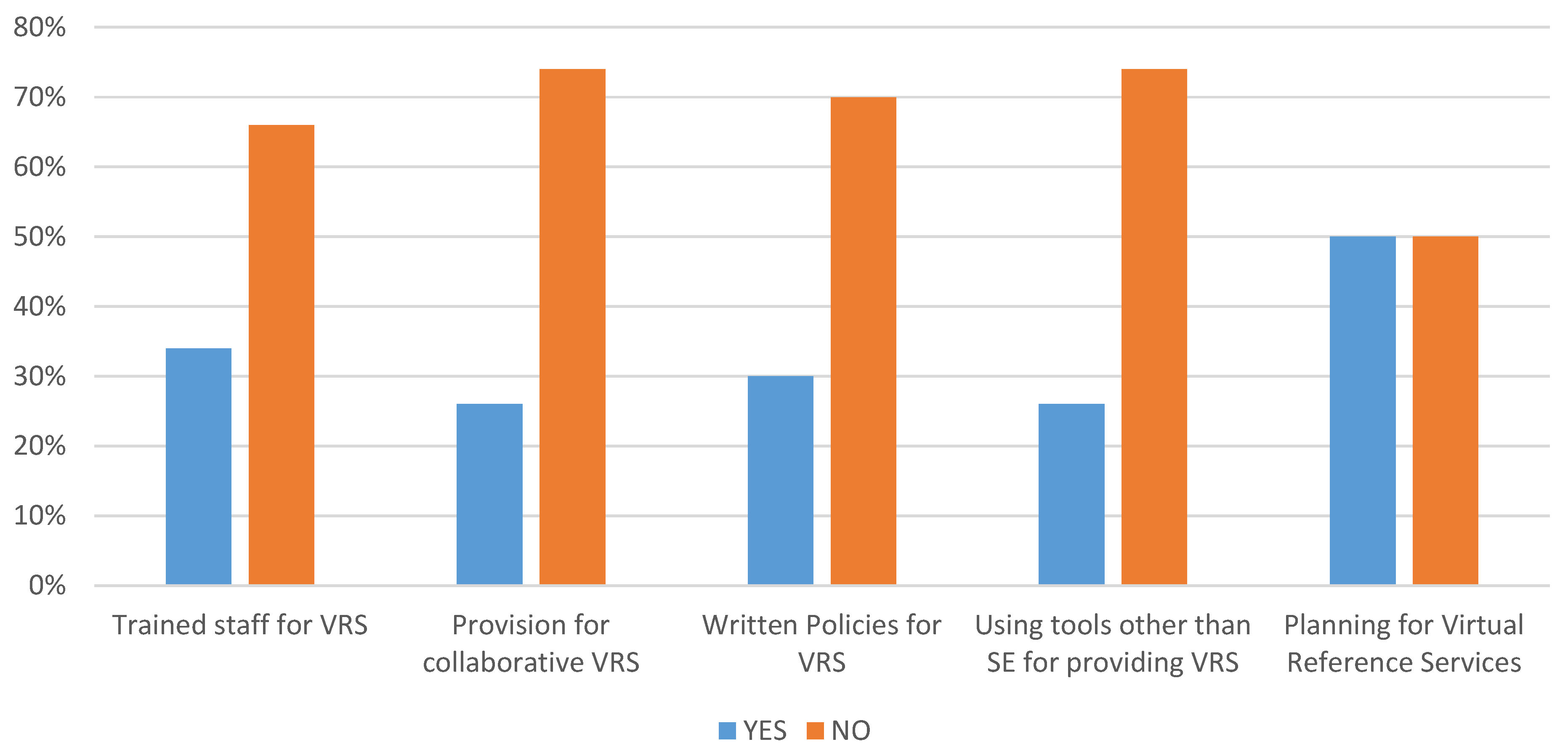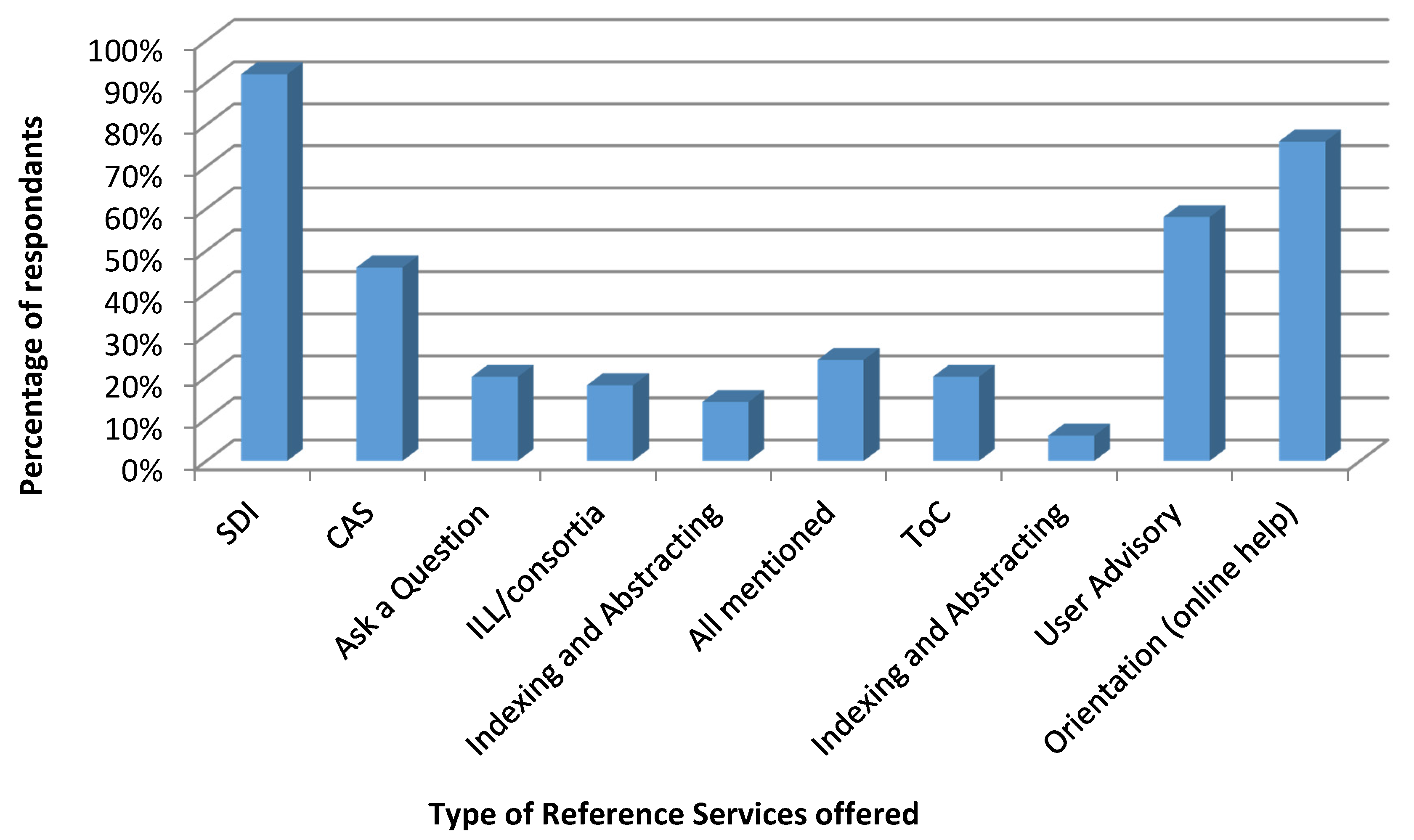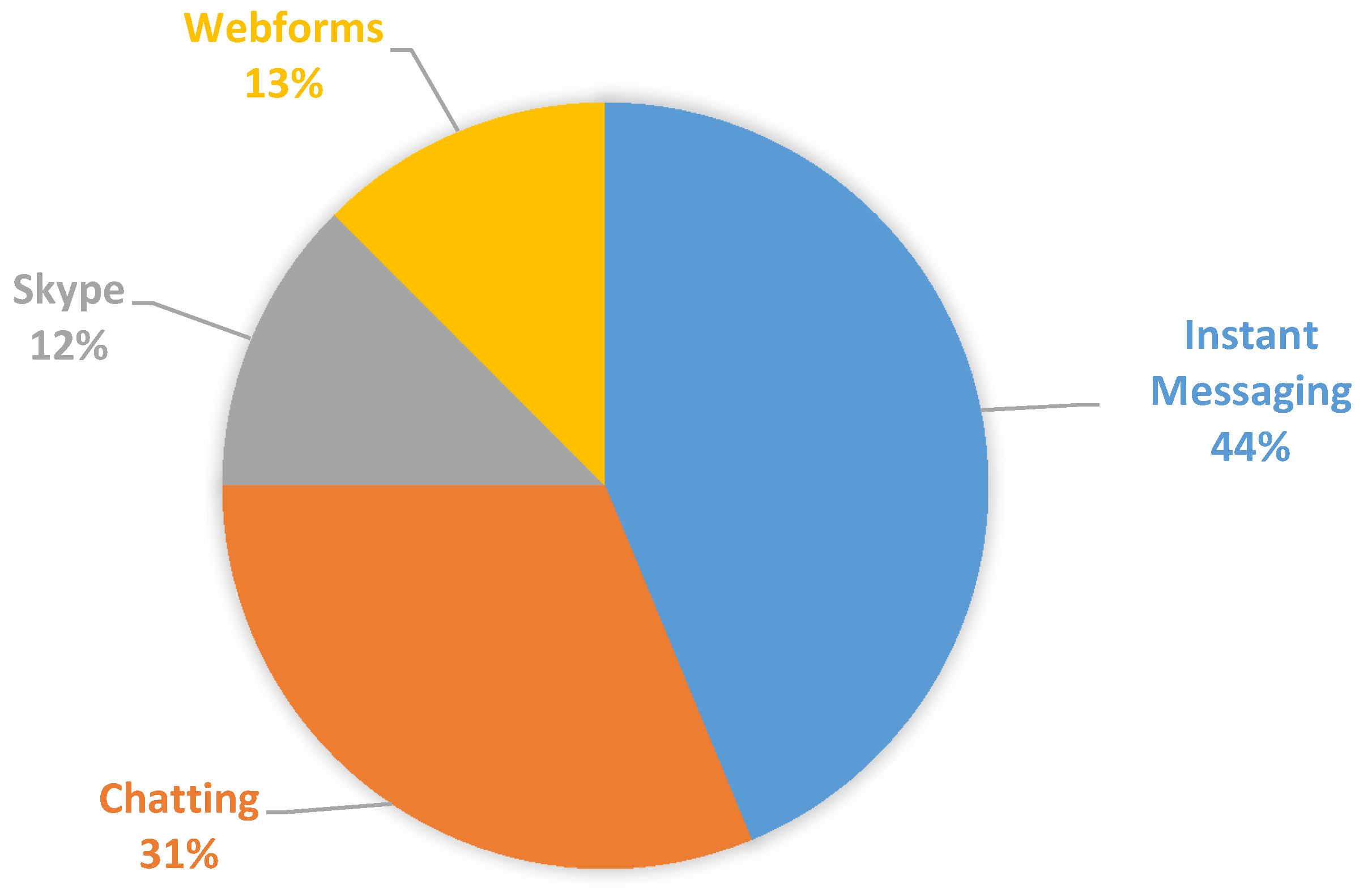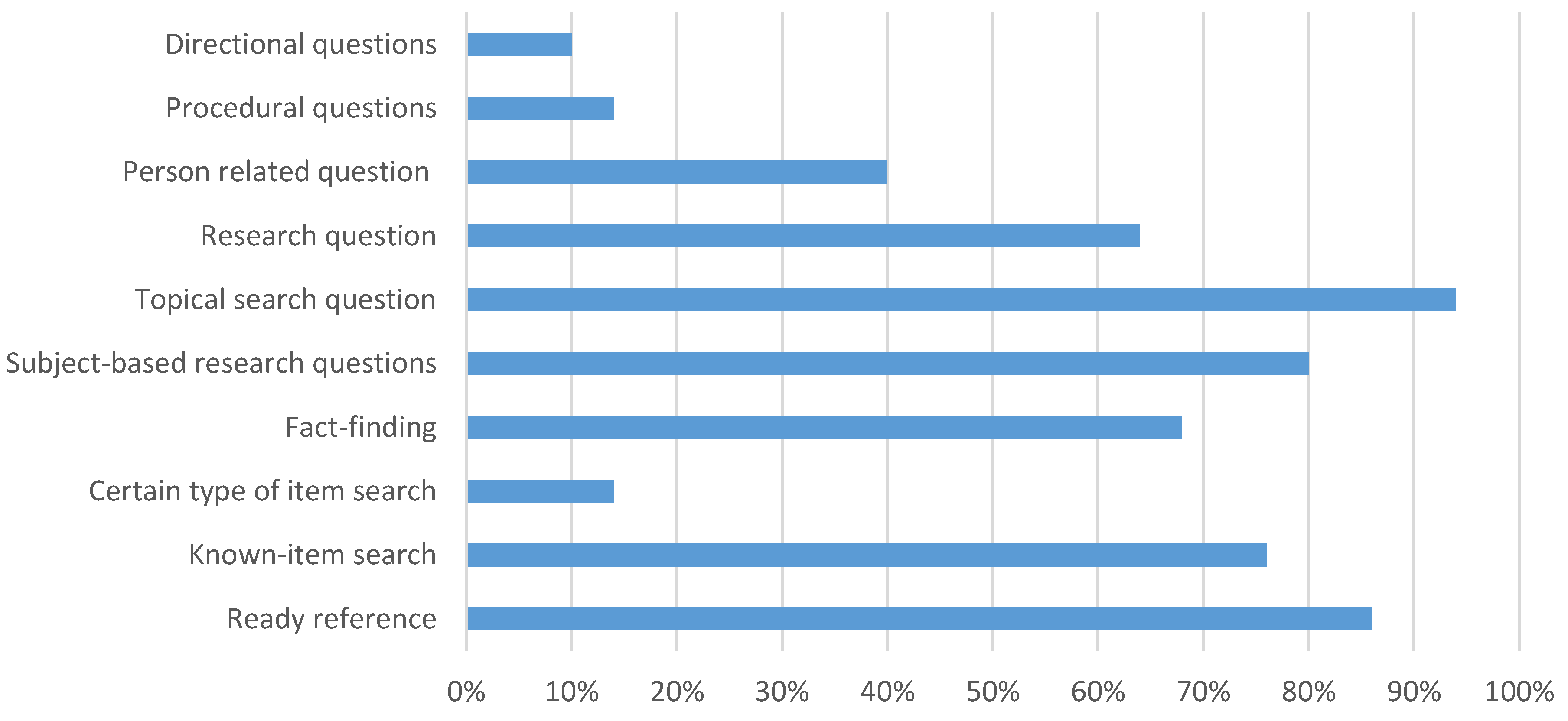Virtual Reference Services through Web Search Engines: Study of Academic Libraries in Pakistan
Abstract
:1. Introduction
Research Questions
- What is the current state of VRS in university libraries in Pakistan?
- How far is web search engines (WSE) used to provide VRS in Pakistani libraries?
- Which type of reference questions are generally dealt with by university librarians in Pakistan?
- What channels are being used by library staff to provide VRS to its patrons?
2. Materials and Methods
3. Related Literature
4. Findings and Discussion
4.1. Current State of Affairs of Providing VRS in Pakistani University Libraries
4.2. Virtual Reference Services in Pakistani Libraries
4.3. Time Spent on Providing VRS
4.4. Search Engines as Threat for Libraries
4.5. Use of SE in Providing VRS
4.6. Channels of Providing VRS
4.7. Reference Service Question Types
5. Discussion
6. Conclusions
7. Recommendations
- (a)
- The libraries that are not providing virtual reference services at the moment should adopt such services to attract users.
- (b)
- University libraries should depute competent and technically sound staff to the reference section, especially for digital reference services, and such staff should be compensated accordingly. Such staff should also be trained and equipped with use of new tools and technologies in providing VRS.
- (c)
- Online chatting tools are very popular in providing VRS in libraries. These should also be adopted in university libraries in Pakistan.
- (d)
- Libraries should plan their activities and they should focus on user needs, their education and information on digital literacy.
- (e)
- University libraries should have a written policy to set SOPs (standard operating procedure) for provision of digital reference services within the university and to collaborate with other university libraries.
- (f)
- Libraries should market their reference service section/desk in order to attract users and make research students and the faculty more familiar with such services.
- (g)
- Resource mobilization of trained VRS staff is also recommended among university libraries in Pakistan.
Author Contributions
Conflicts of Interest
Appendix A. Virtual Reference Services in University Libraries of Pakistan
| Name of University | |
| Designation | |
| Department/Section | |
| Gender | |
| Qualification | |
| Which library you are currently working at? Main Library ☐ Departmental/Seminar Library ☐ | |
| Q.1 | What is the current status of digital/virtual reference services (VRS) at your library. | ||
| Do you: | YES | NO | |
| Have trained staff to provide VRS | ☐ | ☐ | |
| Collaborate with other libraries in providing VRS | ☐ | ☐ | |
| Have written policy or statement for VRS | ☐ | ☐ | |
| Use digital tools to provide VRS | ☐ | ☐ | |
| Have planning to start/strengthen VRS at your library | ☐ | ☐ | |
| Q.2 | In which year did you receive your MLIS degree or equivalent professional degree? | ||
| Q.3 | In which of the following settings have you received formal training on the Internet or its uses? | ||
| ☐ In your professional degree program | |||
| ☐ In your current position | |||
| ☐ In previous professional position | |||
| Q.4 | Do you think search engines are threats for libraries? | ||
| ☐ Yes | |||
| ☐ No | |||
| ☐ Don’t know | |||
| Q.5 | Do you think that search engines can be used to provide reference services to users? | ||
| ☐ Yes | |||
| ☐ No | |||
| ☐ May be | |||
| Q.6 | Rate the following search engines to be used effectively in providing better reference services | ||
| Ask Jeeves | 1 ☐ very useful | ||
| 2 ☐ somewhat useful | |||
| 3 ☐ not very useful | |||
| 4 ☐ not at all useful | |||
| Alta Vista | 1 ☐ very useful | ||
| 2 ☐ somewhat useful | |||
| 3 ☐ not very useful | |||
| 4 ☐ not at all useful | |||
| Excite | 1 ☐ very useful | ||
| 2 ☐ somewhat useful | |||
| 3 ☐ not very useful | |||
| 4 ☐ not at all useful | |||
| Yahoo | 1 ☐ very useful | ||
| 2 ☐ somewhat useful | |||
| 3 ☐ not very useful | |||
| 4 ☐ not at all useful | |||
| 1 ☐ very useful | |||
| 2 ☐ somewhat useful | |||
| 3 ☐ not very useful | |||
| 4 ☐ not at all useful | |||
| Q.7 | Do you feel that library users are more inclined towards use of search engines rather than consulting the library’s reference desk/section? | ||
| ☐ Yes | |||
| ☐ No | |||
| ☐ Don’t know | |||
| Q.8 | Has the availability of Internet-based resources made reference services more challenging | ||
| ☐ Yes | |||
| ☐ No | |||
| ☐ Don’t know | |||
| Q.9 | What percentage of total library visitors do you think are consulting your library’s Reference Desk daily | ||
| ☐ 20% | |||
| ☐ 40% | |||
| ☐ 60% | |||
| ☐ 80% | |||
| Q.10 | Which of the following services are currently offered by your library to its patrons? Please tick as much as apply to your library | ||
| ☐ SDI | |||
| ☐ Interlibrary Loan | |||
| ☐ CAS | |||
| ☐ Professional Communication | |||
| ☐ Receiving and Answering questions | |||
| ☐ All of above | |||
| ☐ Any other (Please mention) | |||
| __________________________________________________________________ | |||
| Q.11 | What are the delivery channels/tools you prefer to use for providing reference services | ||
| Telephone | ☐ often | ||
| ☐ sometimes | |||
| ☐ seldom | |||
| ☐ never | |||
| Fax | ☐ often | ||
| ☐ sometimes | |||
| ☐ seldom | |||
| ☐ never | |||
| ☐ often | |||
| ☐ sometimes | |||
| ☐ seldom | |||
| ☐ never | |||
| Instant Messaging | ☐ often | ||
| ☐ sometimes | |||
| ☐ seldom | |||
| ☐ never | |||
| Chatting | ☐ often | ||
| ☐ sometimes | |||
| ☐ seldom | |||
| ☐ never | |||
| ☐ often | |||
| ☐ sometimes | |||
| ☐ seldom | |||
| ☐ never | |||
| Q.12 | For how long have these services been offered? | ||
| ☐ 3–6 months | |||
| ☐ 1–2 years | |||
| ☐ 2–5 years | |||
| ☐ Don’t know | |||
| Q.13 | How many hours do you work on reference desk/section on a daily basis? | ||
| ☐ 1–2 h | |||
| ☐ 2–4 h | |||
| ☐ 4–6 h | |||
| ☐ 6–8 h | |||
| ☐ never worked | |||
| Q.17 | Which of the following types of reference questions do you get at your reference desk/section? Please read the sample question in parenthesis if you’re not aware of the given choices. | ||
| ☐ Directional Questions………... | (What is the web link for the library OPAC?) | ||
| ☐ Procedural Questions ……….. | (Do you have circulation policy for outsiders?) | ||
| ☐ Person-related questions …… | (Do you have any books on the poems of Ahmad Faraz?) | ||
| ☐ Research question …………... | (I am looking for information on honor killing cases reported in newspaper in the last month) | ||
| ☐ Topical research question ……. | (I am looking for review studies on information management) | ||
| ☐ Subject-based question ……... | (Where can I find information about gender equality?) | ||
| ☐ Ready reference question …… | (How do I cite an online video in APA format?) | ||
| ☐ Certain type of item searching | (Do you have Pakistan Economic Survey 1999) | ||
| ☐ Fact finding ……………………. | (Where can I have latest census report on education in Pakistan) | ||
| ☐ Known item searching ………. | (I need dictionary of idioms) | ||
| Q.18 | Which of the following channels are being used by you to provide reference services to the user? | ||
| ☐ Skype | |||
| ☐ Web Forms/Emailing | |||
| ☐ Instant Messaging | |||
| ☐ SMS | |||
| ☐ Web Chatting | |||
| ☐ Window Live Messenger | |||
| ☐ Any Other (please mention) | |||
| ___________________________________________________________________ | |||
| Q.19 | Please provide your feedback on how the current situation of providing digital/virtual reference services in university libraries can be improved? | ||
| ______________________________________________________________________________________________________________________________________ | |||
| ______________________________________________________________________________________________________________________________________ | |||
| ______________________________________________________________________________________________________________________________________ | |||
References
- Dudek, D.; Mastora, A.; Landoni, M. Is Google the answer? A study into usability of search engines. Libr. Rev. 2007, 56, 224–233. [Google Scholar] [CrossRef]
- Carlson, S. Are reference desks dying out? Librarians struggle to redefine–and in some cases eliminate–the venerable institution. Ref. Libr. 2007, 48, 25–30. [Google Scholar] [CrossRef]
- Marsteller, M.R.; Schmitt-Marsteller, J. Opportunities for real-time digital reference service. Ref. Libr. 2003, 38, 163–181. [Google Scholar] [CrossRef]
- Janes, J. Digital reference: Reference Librarian’s experience and attitudes. J. Am. Soc. Inf. Sci. Technol. 2002, 53, 549–566. [Google Scholar] [CrossRef]
- Numminen, P.; Vakkari, P. Question types in public libraries’ digital reference service in Finland: Comparing 1999 and 2006. J. Am. Soc. Inf. Sci. Technol. 2009, 60, 1249–1257. [Google Scholar] [CrossRef]
- Bar-Ilan, J.; Mat-Hassan, M.; Levene, M. Methods for comparing rankings of search engine results. Comput. Netw. 2006, 50, 1448–1463. [Google Scholar] [CrossRef]
- Greenstein, D.; Smith, A.; Tiedt, D. The library as search engine. Chron. Higher Educ. 2007, 53, B24. [Google Scholar]
- Dickinson, Z.; Smit, M. Being where the people are: The challenges and benefits of search engine visibility for public libraries. Libr. Hi Tech. News 2015, 32, 11–15. [Google Scholar] [CrossRef]
- Tenopir, C.; Ennis, L.A. Reference services in the new millennium. ONLINE-WESTON THEN WILTON 2001, 25, 40–45. [Google Scholar]
- Dreilinger, D.; Howe, A.E. Experiences with selecting search engines using Meta search. ACM Trans. Inf. Syst. 1997, 15, 195–222. [Google Scholar] [CrossRef]
- Waller, V. Not just information: Who searches for what on the search engine Google? J. Am. Soc. Inf. Sci. Technol. 2011, 62, 761–775. [Google Scholar] [CrossRef]
- Norris, B.P. Google: Its impact on library. Libr. Hi Tech News 2006, 23, 9–11. [Google Scholar] [CrossRef]
- Luh, C.-J.; Yang, S.-A.; Huang, T.-L.D. Estimating google’s search engine ranking function from a search engine optimization perspective. Online Infor. Rev. 2016, 40, 239–255. [Google Scholar] [CrossRef]
- Asadi, S.; Zhou, X.; Yang, G. Using local popularity of web resources for geo-ranking of search engine results. World Wide Web 2009, 12, 149–170. [Google Scholar] [CrossRef]
- Jain, V.; Saraf, S. Google search engine and its usefulness to library professionals. DESIDOC J. Libr. Infor. Technol. 2006, 26, 23–28. [Google Scholar] [CrossRef]
- Moreno, L.; Martinez, P. Overlapping factors in search engine optimization and web accessibility. Online Infor. Rev. 2013, 37, 564–580. [Google Scholar] [CrossRef]
- Choi, Y. Reference services in digital collections and projects. Ref. Serv. Rev. 2006, 34, 129–147. [Google Scholar] [CrossRef]
- Chowdhury, G.G. Digital libraries and reference services: Present and future. J. Doc. 2002, 58, 258–283. [Google Scholar] [CrossRef]
- Lankes, R.D. The Roles of Digital Reference in a Digital Library Environment. In Proceedings of the International Conference of Digital Library-Advance the Efficiency of Knowledge Utilization, Beijing, China, 6–8 September 2004. [Google Scholar]
- Goldfarb, A.; Tucker, C. Economic and business dimensions search engine advertising. Commun. ACM 2008, 51, 22–24. [Google Scholar] [CrossRef]
- Akhigbe, B.I.; Afolabi, B.S.; Adagunodo, E.R. Modelling user-centered attributes: The web search engine as a case. Knowl. Org. 2015, 42, 25–39. [Google Scholar]
- Malik, A.; Mahmood, K. Infrastructure needed for digital reference services in university libraries. Explor. Surv. Punjab Pak. 2013, 62, 420–428. [Google Scholar] [CrossRef]
- Pomerantz, J. Integrating digital reference service into the digital library environment. In The Digital Reference Research Agenda; Association of College and Research Libraries: Chicago, IL, USA, 2003; Available online: http://arizona.openrepository.com/arizona/bitstream/10150/105560/1/Dig_Ref_in_DLs.pdf (accessed on 28 March 2017).
- Ramos, M.S.; Abrigo, C.M. Reference 2.0 in action: An evaluation of the digital reference services in selected philippine academic libraries. Libr. Hi. Tech. News 2012, 29, 8–20. [Google Scholar] [CrossRef]
- Younus, M. Digital Reference Services in University Libraries of Pakistan (Doctoral Dissertation, © Muhammad Younus). Loughborough University: Loughborough, UK, 2014. [Google Scholar]
- Liu, J. An overview of the digital reference services in German libraries. BIBLIOTHEK Forsch. Praxis 2008, 32, 359–371. [Google Scholar] [CrossRef]
- Mirza, M.S.; Mahmood, K. Web-based services in university libraries: A pakistani perspective. Libr. Philosoph. Pract. (e-journal) 2009. Available online: http://digitalcommons.unl.edu/cgi/viewcontent.cgi?article=1284&context=libphilprac (accessed on 24 August 2016).
- Nicholas, P. Creating a Digital Reference Agenda for Academic Libraries in Jamaica: An Exploratory Case Study. Libr. 2011, 61. [Google Scholar] [CrossRef]
- Obaseki, T.; Maidabino, A.A.; Makama, F.H. The development and challenges of virtual library services in nigerian colleges of education. Trends Infor. Manag. 2013, 8. [Google Scholar]
- Rusuli, C.; Saufi, M.; Tumari, M.; Hasman, M.N.; Razak, B.A.; Norazlin, H.; Rosmaini, T.; Fikri, M.N.; Farahin, N.; Norfaizah, J. Reference desk service direction in digital age: A comparative study. In Proceedings of the 7th World Congress of Muslim Librarians and Information Scientists 2014 (WCOMLIS), Alor Setar, Kedah, 25–26 February 2014. [Google Scholar]
- Bakar, A.; Bakeri, A. Virtual reference service in the muslim world: Opportunities and challenges. Libr. Philosoph. Pract. 2009, 287. Available online: http://digitalcommons.unl.edu/cgi/viewcontent.cgi?article=1294&context=libphilprac (accessed on 16 September 2016).
- Radford, M.L.; Connaway, L.S. Not dead yet! A longitudinal study of query type and ready reference accuracy in live chat and IM reference. Libr. Inf. Sci. Res. 2013, 35, 2–13. [Google Scholar] [CrossRef]
- Sajjad Ahmed, S. Managing change to enhance web-based services in the arabian gulf libraries. Online Infor. Rev. 2002, 26, 265–270. [Google Scholar] [CrossRef]
- Maharana, B.; Panda, K.C. Virtual Reference Service in Academic Libraries: A Case Study of the Libraries of IIMs and IITs in India. 2005. Available online: http://eprints.rclis.org/9314/1/virtual_reference_service.pdf (accessed on 6 November 2016).
- Sekyere, K. Virtual reference service in academic libraries in West Africa. J. Libr. Inf. Serv. Distance Learn. 2011, 5, 3–9. [Google Scholar] [CrossRef]




© 2017 by the authors. Licensee MDPI, Basel, Switzerland. This article is an open access article distributed under the terms and conditions of the Creative Commons Attribution (CC BY) license (http://creativecommons.org/licenses/by/4.0/).
Share and Cite
Khan, R.; Khan, A.; Malik, S.; Idrees, H. Virtual Reference Services through Web Search Engines: Study of Academic Libraries in Pakistan. Publications 2017, 5, 6. https://doi.org/10.3390/publications5020006
Khan R, Khan A, Malik S, Idrees H. Virtual Reference Services through Web Search Engines: Study of Academic Libraries in Pakistan. Publications. 2017; 5(2):6. https://doi.org/10.3390/publications5020006
Chicago/Turabian StyleKhan, Rubia, Arif Khan, Sidra Malik, and Haroon Idrees. 2017. "Virtual Reference Services through Web Search Engines: Study of Academic Libraries in Pakistan" Publications 5, no. 2: 6. https://doi.org/10.3390/publications5020006
APA StyleKhan, R., Khan, A., Malik, S., & Idrees, H. (2017). Virtual Reference Services through Web Search Engines: Study of Academic Libraries in Pakistan. Publications, 5(2), 6. https://doi.org/10.3390/publications5020006






